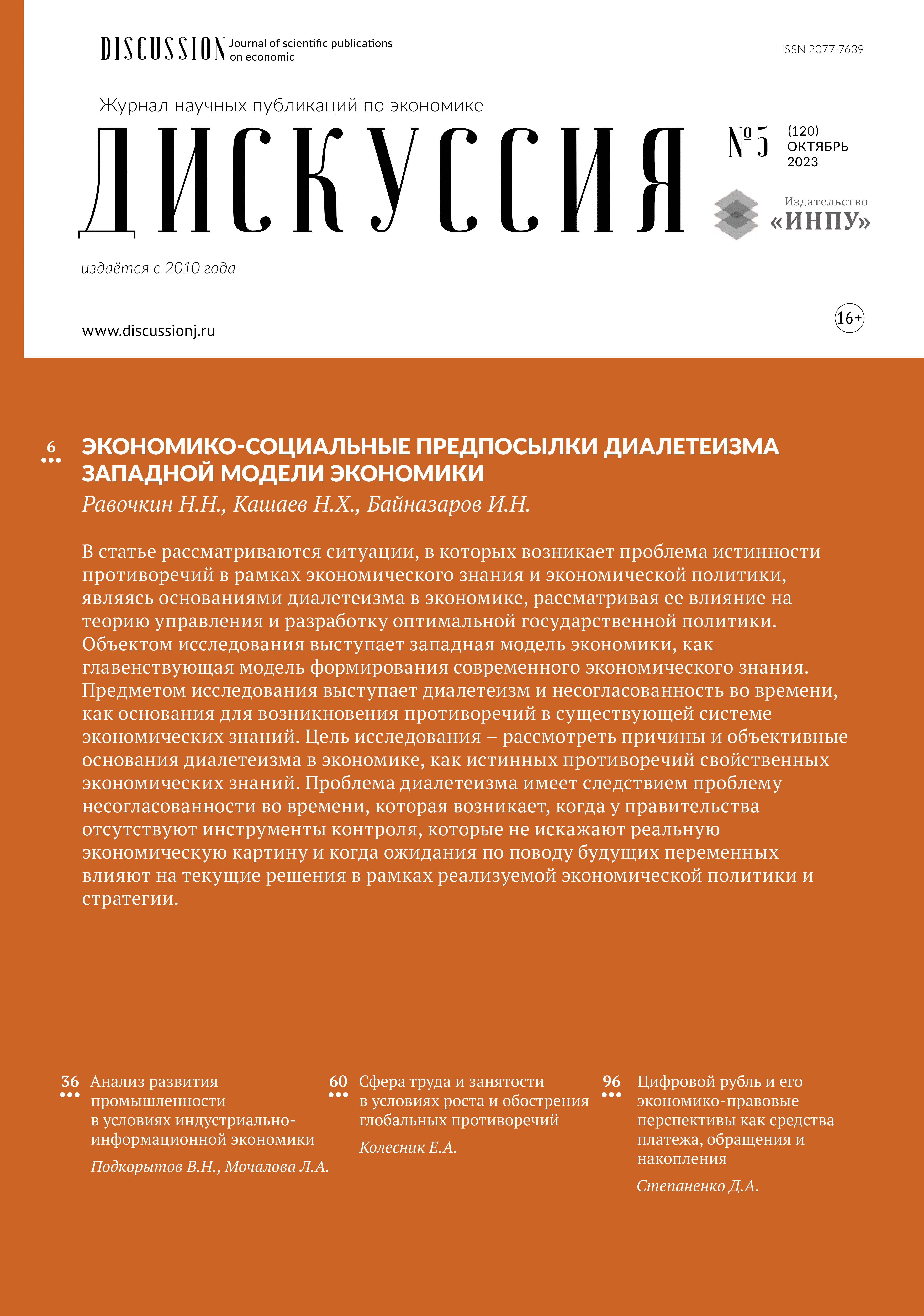ECONOMIC AND SOCIAL PREREQUISITES OF DIALETHEISM IN THE WESTERN ECONOMIC MODEL
Keywords:
Time inconsistency, true contradiction, economic policy, economic knowledge, logic, contradictionAbstract
The article examines situations in which the problem of the truth of contradictions arises within the framework of economic knowledge and economic policy, being the basis of dialetheism in economics, considering its impact on management theory and the development of optimal public policy. The object of the study is the Western model of economics, as the dominant model for the formation of modern economic knowledge. The subject of the study is dialetheism and inconsistency in time, as the basis for the emergence of contradictions in the existing system of economic knowledge. The purpose of the study is to consider the causes and objective foundations of dialetheism in economics, as true contradictions inherent in economic knowledge. The problem of dialetheism is a consequence of the problem of time inconsistency, which arises when the government lacks control tools that do not distort the real economic picture and when expectations about future variables influence current decisions within the framework of implemented economic policies and strategies. The article reveals that this problem can arise if policy goals differ from the original goals of the strategy, however, these circumstances do not exclude the use of optimal control theory in economic policy analysis, however, it raises serious questions regarding optimal control methods, which are especially important for the development economic policy and fulfillment of social obligations. The authors reveal a mechanism for resolving contradictions and inconsistencies with time, which includes the implementation of economic policy on the following grounds: Trust, which is achieved by maintaining the consistency of political decisions and compliance of actions with statements; Transparency is achieved by clearly informing citizens of political intentions and reasons; Social commitment mechanisms involve the development of policy rules, the independence of Central Banks and contractual obligations that ensure compliance with the policy plan.
Downloads
Metrics
References
Priest G., Berto F., Weber Z. Dialetheism. – 1998.
Priest G. Paraconsistency and dialetheism //The many valued and nonmonotonic turn in logic. – 2007. – Т. 8. – С. 129-204.
Parsons T. True contradictions //Canadian Journal of Philosophy. – 1990. – Т. 20. – №. 3. – С. 335-353.
Whittle B. Dialetheism, logical consequence and hierarchy //Analysis. – 2004. – Т. 64. – №. 4. – С. 318-326.
Acharya V. V., Yorulmazer T. Too many to fail—An analysis of time-inconsistency in bank closure policies //Journal of financial intermediation. – 2007. – Т. 16. – №. 1. – С. 1-31.
Chari V. V., Kehoe P. J. Time Inconsistency and Free‐Riding in a Monetary Union //Journal of Money, Credit and Banking. – 2008. – Т. 40. – №. 7. – С. 1329-1356.
Beardsley K. Agreement without peace? International mediation and time inconsistency problems //American Journal of Political Science. – 2008. – Т. 52. – №. 4. – С. 723-740.
Davis S., Fujiwara I., Wang J. Dealing with time-inconsistency: Inflation targeting vs. exchange rate targeting. – 2018.
Hillier B. Time inconsistency and the theory of second best //Scottish Journal of Political Economy. – 1989. – Т. 36. – №. 3. – С. 253-265.
Chari V. V., Kehoe P. J. Bailouts, time inconsistency, and optimal regulation. – National Bureau of Economic Research, 2013. – №. w19192.
Hansen L. P., Sargent T. J. Time inconsistency of robust control? //Macroeconomics in the Small and the Large. – Edward Elgar Publishing, 2008.
Mejia J., Albrecht B. C. Time Inconsistency, Inflation, and MMT. – 2020.
Sachsida A., Divino J. A., Cajueiro D. O. Inflation, unemployment, and the time consistency of the US monetary policy //Structural Change and Economic Dynamics. – 2011. – Т. 22. – №. 2. – С. 173-179.
Kleinberg J., Oren S. Time-inconsistent planning: a computational problem in behavioral economics //Proceedings of the fifteenth ACM conference on Economics and computation. – 2014. – С. 547-564.
Wong W. K. How much time-inconsistency is there and does it matter? Evidence on self-awareness, size, and effects //Journal of Economic Behavior & Organization. – 2008. – Т. 68. – №. 3-4. – С. 645-656.
Attema A. E. et al. Time-tradeoff sequences for analyzing discounting and time inconsistency //Management Science. – 2010. – Т. 56. – №. 11. – С. 2015-2030.
Selgin G., Lastrapes W. D., White L. H. Has the Fed been a failure? //Journal of Macroeconomics. – 2012. – Т. 34. – №. 3. – С. 569-596.
Notermans T., Piattoni S. EMU and the Italian debt problem: destabilising periphery or destabilising the periphery? //Economic and Monetary Union at Twenty. – Routledge, 2021. – С. 58-75.
Sengupta J. K. Stochastic models in dynamic economics: problems of time inconsistency, causality and estimation //Information and Efficiency in Economic Decision. – Dordrecht : Springer Netherlands, 1985. – С. 297-348.
Pervan M., Višić J., Pavić I. Inconsistency in consumer preferences: Some interesting insights //Procedia economics and finance. – 2015. – Т. 23. – С. 726-732.
Downloads
Published
How to Cite
Issue
Section
Categories
License
Copyright (c) 2024 Н. Н. Равочкин, Н. Х. Кашаев, И. Н. Байназаров

This work is licensed under a Creative Commons Attribution-NonCommercial-NoDerivatives 4.0 International License.
Авторы, публикующие произведения в журнале «Дискуссия», соглашаются со следующими условиями:
- Авторы сохраняют за собой авторское право и предоставляют журналу право первой публикации произведения, одновременно лицензированной в соответствии с лицензией Creative Commons Attribution, позволяющей другим лицам пользоваться произведением с подтверждением авторства и первоначальной публикации в журнале «Дискуссия».
- Авторы вправе заключать с иными лицами лицензионные договоры на условиях простой (неисключительной) лицензии на использование опубликованного в журнале «Дискуссия» произведения (например, размещение его в базах данных университетов, публикация в книге), со ссылкой на его оригинальную публикацию в этом журнале.
- Автор гарантирует, что является правообладателем всех материалов, предоставляемых в редакцию, и что исключительные права на данные материалы не переданы или не предоставлены другим лицам.
- Авторам разрешено и рекомендуется размещать свое произведение в Интернете до и во время процесса подачи, поскольку это может привести к продуктивному обмену, а также к более раннему и более широкому цитированию опубликованных работ.
С момента загрузки произведения и сопроводительных материалов через раздел "Отправка материалов", автор полностью и безоговорочно принимает (акцептует) публичную оферту о заключении авторского соглашения об опубликовании произведения. В соотвтетствии с этим соглашением автор предоставляет издателю на безвозмездной основе неисключительную лицензию на использование созданного автором произведения.
С момента получения произведения и прилагаемых к нему материалов журнал "Дискуссия" вправе использовать полученные произведения без ограничений по своему усмотрению и в пределах всего срока действия исключительных прав, но с обязательным указанием имени автора (авторов) произведения, в том числе публиковать произведения (полностью или в сокращении) на территории всего мира, переводить на другие языки, направлять в репозитории научной информации, размещать в сети Интернет и использовать другими законными способами.









